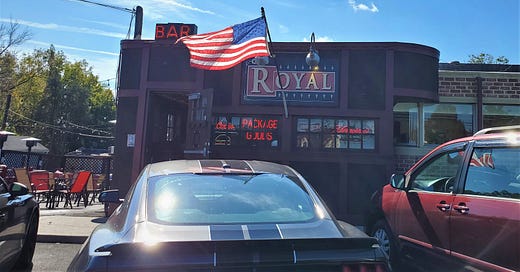I don’t do politics here, but I do follow it, especially in the run-up to Election Day. I still feel a sense of civic pride on these days, a sense that even if we’re voting for totally opposite people, we’re still at least standing in the line voting together.
I remember once, on a Washington, D.C. trip back in the mid-2000s, we saw three helicopters—one of which holds the president—fly over us. My mother, a Republican, marveled that the president was right there, and said it made her proud to be an American. Then she added, “I think I’d feel that way even if it was still Bill Clinton in there.”
Last year, I wrote over at The Spectator World about the election maps that every network, most famously CNN, plaster across their screens on election night. I love those maps. They communicate the vastness and the particularities alike of this country:
Most fascinating to me is the almost ritualistic invocation of various bellwether and swing counties, as well as many more obscure ones. Ashtabula. Macomb. Kent. DeKalb. Nash. Luzerne. Many of them in the sparsely populated rural areas of states that I only know as names on a map. It’s almost mesmerizing. Election nights are about the only time the American public sees, and is really made to grasp, the whole United States in both its massiveness and its granularity….
Those endless counties, and the strangeness with which electoral wins and losses play out, can be frustrating, but they don’t have to represent or foment division; quite the opposite. This is one of those quirky, distinctive, sometimes infuriating aspects of American democracy. Isn’t it kind of amazing that our elections often turn on a handful of not particularly distinguished places that most Americans will never visit and that many have never heard of? Isn’t it so American, in every good and bad and complicated way, that such ordinary people and places are bestowed with this kind of power?
I suppose other democracies have their own versions of this. France, for example, a country with a lot of the same broad divisions, must have it’s own Ashtabula County or Luzerne County. And other countries outperform us in some important ways, like having election results within just a few hours. Meeting in a gym to “caucus” in some freezing Midwestern school auditorium (okay, not an Election Day thing per se) is wacky, but I think we’d lose something if we lost it.
I’ve had an interesting thought about our system of government. We’re trying, basically, to operate as a modern liberal democracy. But our Constitution is wonky and, in the view of some people, outdated. So I thought of a computer analogy: it’s almost like we’re trying to emulate the software of a modern liberal democracy on the quirky hardware of our Constitution. Maybe it doesn’t quite work. Maybe the imperfections are endearing. Maybe both.
I’m nowhere near enough of a political junkie to know what campaigns in previous decades looked like, but I bet a lot of the issues were different. (I’m old enough to remember when creationism in schools was still occasionally a live issue in American politics.) It’s interesting that in the last few years, housing has become a more salient political issue. I’ve even encountered candidates, more in local races, who are basically running on building housing. I don’t know how far back you’d have to go to see that. Maybe the early postwar years, when it was widely understood that we had a housing problem?
Anyway, yes, that’s a segue back to most of what I do here. More of that next time!
Related Reading:
Election Nights and Ice Cream Cones
Pennsylvania’s Unique Housing Crisis
Thank you for reading! Please consider upgrading to a paid subscription to help support this newsletter. You’ll get a weekly subscribers-only post, plus full access to the archive: over 400 posts and growing. And you’ll help ensure more material like this!



